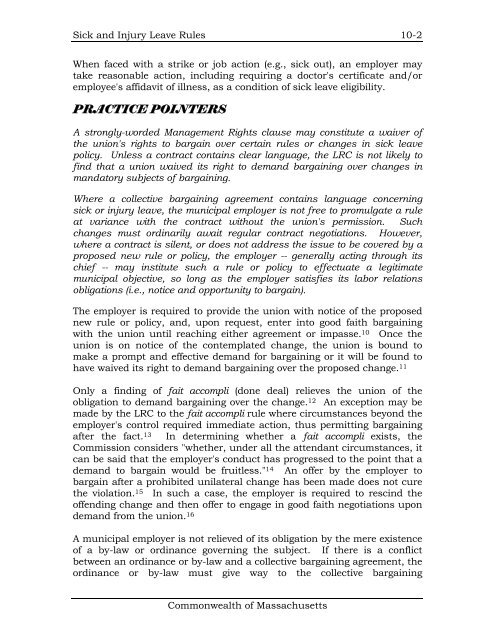Management Rights - AELE's Home Page
Management Rights - AELE's Home Page
Management Rights - AELE's Home Page
Create successful ePaper yourself
Turn your PDF publications into a flip-book with our unique Google optimized e-Paper software.
Sick and Injury Leave Rules 10-2<br />
When faced with a strike or job action (e.g., sick out), an employer may<br />
take reasonable action, including requiring a doctor's certificate and/or<br />
employee's affidavit of illness, as a condition of sick leave eligibility.<br />
PRACTICE POINTERS<br />
A strongly-worded <strong>Management</strong> <strong>Rights</strong> clause may constitute a waiver of<br />
the union's rights to bargain over certain rules or changes in sick leave<br />
policy. Unless a contract contains clear language, the LRC is not likely to<br />
find that a union waived its right to demand bargaining over changes in<br />
mandatory subjects of bargaining.<br />
Where a collective bargaining agreement contains language concerning<br />
sick or injury leave, the municipal employer is not free to promulgate a rule<br />
at variance with the contract without the union's permission. Such<br />
changes must ordinarily await regular contract negotiations. However,<br />
where a contract is silent, or does not address the issue to be covered by a<br />
proposed new rule or policy, the employer -- generally acting through its<br />
chief -- may institute such a rule or policy to effectuate a legitimate<br />
municipal objective, so long as the employer satisfies its labor relations<br />
obligations (i.e., notice and opportunity to bargain).<br />
The employer is required to provide the union with notice of the proposed<br />
new rule or policy, and, upon request, enter into good faith bargaining<br />
with the union until reaching either agreement or impasse. 10 Once the<br />
union is on notice of the contemplated change, the union is bound to<br />
make a prompt and effective demand for bargaining or it will be found to<br />
have waived its right to demand bargaining over the proposed change. 11<br />
Only a finding of fait accompli (done deal) relieves the union of the<br />
obligation to demand bargaining over the change. 12 An exception may be<br />
made by the LRC to the fait accompli rule where circumstances beyond the<br />
employer's control required immediate action, thus permitting bargaining<br />
after the fact. 13 In determining whether a fait accompli exists, the<br />
Commission considers "whether, under all the attendant circumstances, it<br />
can be said that the employer's conduct has progressed to the point that a<br />
demand to bargain would be fruitless." 14 An offer by the employer to<br />
bargain after a prohibited unilateral change has been made does not cure<br />
the violation. 15 In such a case, the employer is required to rescind the<br />
offending change and then offer to engage in good faith negotiations upon<br />
demand from the union. 16<br />
A municipal employer is not relieved of its obligation by the mere existence<br />
of a by-law or ordinance governing the subject. If there is a conflict<br />
between an ordinance or by-law and a collective bargaining agreement, the<br />
ordinance or by-law must give way to the collective bargaining<br />
Commonwealth of Massachusetts
















